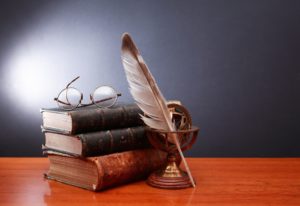
In April, we celebrate National Poetry Month. Many people think poetry is difficult to understand or a lost art form. The language of poetry might be elusive at times, but you can still learn a lot about a person and culture from poems. There are many Christian poets who interweave faith and history to focus on their traditions, but today, let’s take a look at Jewish poets who have opened a dialogue about Jewish culture through their poetry.
Allen Ginsberg
Interestingly, Ginsberg had Jewish roots, but he was a practicing Buddhist. He is best known for his poem “Howl,” which gained publicity when it was the subject of an obscenity lawsuit. As a leading figure in the Beat Generation, Ginsberg is probably one of the most influential writers of the 20th century.
Gertrude Stein
Stein is probably most revered for her novel “The Autobiography of Alice B. Toklas,” but she was also a poet and activist. Stein was part of the Paris modernist art scene. Her literature is considered to be very visual and artistic.
Emma Lazarus
“With silent lips. ‘Give me your tired, your poor,
Your huddled masses yearning to breathe free…’”
Best known for the words on the base of the Statue of Liberty, Emma Lazarus was an advocate of Jewish indigent refugees in the late 19th century. Her Jewish roots trace to Germany, and she was a forerunner of the Zionist movement.
Edmond Jabès
Jabès is a French poet who was born to a Jewish family in Egypt. His work reflects his heritage, Jewish mysticism and the plight of the Jews. He has earned his accolades for writing. Some of his best works have been translated into English.
Leonard Cohen
Cohen began his music career at the age of 33. Before he wrote songs, he wrote poetry. He was born into an Orthodox Jewish family. Reportedly, he was told that his family descended from Aaron, the first Jewish High Priest. In 1964, he published a collection of poems called “Flowers for Hitler,” which were rather controversial during the time. However, it’s not a memorial to Hitler, but a reminder not to let cruelty manifest in your home.
Nelly Sachs
Ms. Sachs’ poetry reflects the grief of the Jewish culture when the Nazis took power. She was born in Germany but fled to Sweden in 1940 with her mom. Even though she suffered from many mental health problems, she still wrote and earned many literary awards for her work.
Boris Pasternak
Most Americans know Pasternak as the author of “Doctor Zhivago,” not as a well-known poet. He was born into a Ukrainian Jewish family, the son of a famous painter. His first book of poetry, “My Sister – Life,” is a personal journey of life and love against the backdrop of the October Revolution. It is considered one of the most influential books of Russian poetry.
Dorothy Parker
Although Parker’s father was Jewish and her stepmother was Protestant, she attended a Roman Catholic elementary school. Parker is known for satire and wit, even joking about marrying to escape her Jewish maiden name of Rothschild. Her first poem was published in Vanity Fair, and she would work at Vogue as an editorial assistant for a while. The New York Times didn’t have much to say about her work, calling it “flapper verse,” but she became quite popular. She went on to be a vocal advocate of civil liberties.
Make National Poetry Month Part of Your Life This April
Take some time to read poetry this April. Carry a poem in your pocket or join an email list from poets.org to get a poem in your inbox every morning. Share poems with your friends and read about different poetic forms to find words that fill your life with art.

